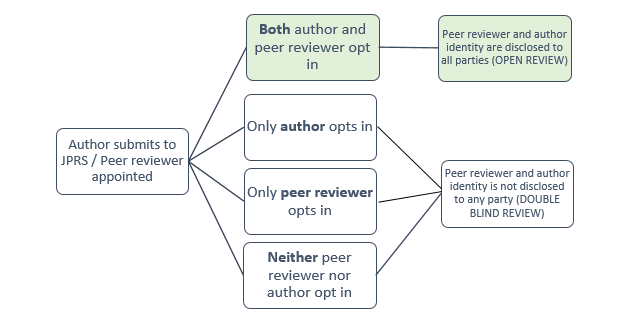Throughout 2022-2024, JPRS will be piloting a new peer review process. The pilot is opt-in – our current double-blind review policy will remain in place by default. The following outlines the pilot policy, how you can opt-in, and how we will be reviewing the pilot.
What is the difference between double blind, single blind, and open peer review?
The current practice at JPRS is double blind, pre-publication peer review policy. This means that peer-review is carried out before publication, the identity of the author is not disclosed to the reviewer, and the identity of the reviewer is not disclosed to the author.
Single blind peer review means that the author does not know the identity of the reviewer, but the reviewer does know the author’s identity at all stages of review.
Open review means that the author and reviewer identity is known to all participants, at all stages of peer review.
What does the pilot policy involve?
The JPRS pilot creates an open review process, where the author and reviewer identity is known to all participants, at all stages of peer review. The pilot only applies when all parties opt in. If one party does not opt-in, the usual double blind policy will apply to all parties. See the flowchart below for more information. All other aspects of peer review (length of time, declaration of conflict of interest, communication, reviewer guidance) remain unchanged (see ‘Peer Review’ policy).
How do I opt-in?
Authors and reviewers will be given a choice of opting in to the pilot process on submission of an article, or in an invitation to review for JPRS. Each party will be asked to read this information carefully before making a decision.
Can I change my mind?
You can withdraw from the pilot at any point, although please bear in mind that your identity may have already been shared with another party. Withdrawal from the pilot will not result in existing reviewers being dismissed, although all parties will be informed of any withdrawn consent and will be asked to adapt accordingly, as far as possible. JPRS has a peer review policy that all reviewers must read and agree to before undertaking peer review. The journal also has a Peer Review Appeals policy.
Why are you doing this?
Academic journals adopt a range of different approaches to peer review (see e.g. Wiley, ‘Types of peer review’). Arguments have been made both for and against more open review practices. At JPRS, we are seeking ways to better support our small field to develop and grow. We are interested in finding out if adopting a more open review policy might have a positive effect on the quality and volume of articles published in JPRS, and on the wider academic community. We are particularly interested to find out if a more open review policy will benefit early career and independent researchers in our field.
How will you be reviewing the policy?
After all peer review has been completed, we will contact all those who opt in to the pilot to ask if they consent to take part in a research study to explore experiences of the open review pilot. If consent is granted, participants will be asked to complete a short questionnaire. We may also collect data through email, video or phone call, or other methods. The responses will be important to us in any decision to extend, modify, or expand the pilot. The data will be collated and anonymised and presented to the JPRS Editorial Board after the pilot period has elapsed. A report based on the data will be published open access in JPRS to ensure the pilot results are disseminated. We have received ethical approval for this review through the University of Birmingham, UK (ref: ERN_21-1624).
What if I have concerns or questions?
You can contact the General Issues Managing Editor, Dr Amy Burge, at managing.editor@jprstudies.org We kindly ask you to bear with us as we roll out this pilot – it is a new process and there may be some small issues. We will do our best to communicate clearly and regularly with all involved parties.
